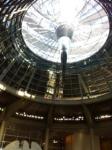As we flew over rows and rows of trees into Belgium with the dusk sun peeking through the clouds, I suddenly became overwhelmed with emotions. I felt like pinching myself to make sure I was really here, flying across countries, visiting places and seeing officials I only heard about or read about. I hid the tears from my crew by looking out of the window (now they will know). My RIAS crew have all experienced over seas traveling. Each one has gone somewhere abroad, but for me this was my first experience! I was just so thankful to be chosen. Thankful that I could see the things that I’ve seen and that I am able to tell others about RIAS.
I purchased my passport six years ago and always hoped that someday I would use it. I’ve used it more in these two weeks than all those wishful years. Get your passport now! You never know when a colleague might whisper in your ear about an exchange program in your professional field or do your own research to find a legitimate organization. This has been well worth it! Before I log off for the night, I want to share more with you about Brussels.
Yesterday we spent the day at the European Commission. We heard from officials about the countries that form the European Union, the Euro zone and the and role of the commissioners. We sat in on a live press conference in the EU press room. It reminded me of the White House briefing (not that I’ve ever been to one, but I imagine that’s what it would feel like). It was presented in two languages, French and English. We wore headphones for the translation.
Today we spent the day and lunch at NATO’s (the North Atlantic Treaty Organization’s) headquarters in Brussels. I could only take a picture from the bus that NATO sent for us. No cameras, or cell phones allowed inside. This was one of the most interesting seminars.
We spoke with NATO officials about NATO’s duty to keep the bonds between nations and defend each of those nations against attacks. I learned that there are 26 countries along with the U.S. and Germany…that are members of NATO and 22 countries including Russia that are partners with NATO and there is dialogue going on with several others.
I learned so much about Afghanistan and how NATO is working with the country to build and maintain a security and police force there.
Right now, even though there are other operatives going on such as Kosovo, and Operation Ocean Shield concerning piracy, Afghanistan is the top priority. A NATO official who spoke with us stated that they hope to achieve the goal of Afghanistan taking control of its own security force and police force by 2014. NATO also wants to make sure Afghanistan will never be another safe haven for terrorists.
But this will take time and NATO says it will continue advising, assisting and training troops for Afghanistan.
It was fascinating to listen to this because I understood it better after I was able to ask questions.
NATO also talked about its missile defense concept and the recent summit where they discussed ways to bring all nations within NATO under the same model of weaponry defense.
I thought it was going to be difficult to understand, but our NATO speakers were great.
Our last day will be a trip to Bruges. I’ll have one more entry for you. Until then…
- photo 19
- photo 29
- photo 39
- photo 47
- photo 57















































